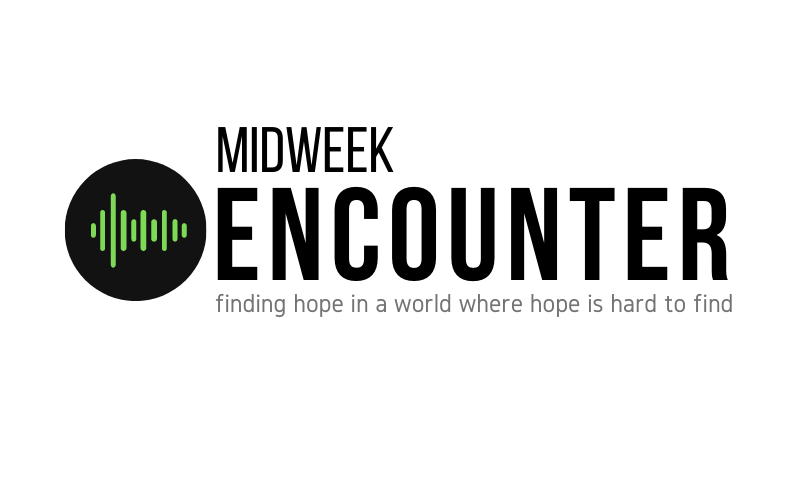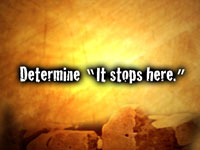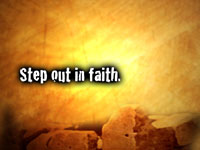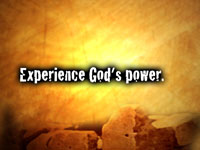



Newark Naz Williams/Real Life – September 23, 2007
Illustration: I was looking at some family photos this past week and I thought I would bring a few to show you.
Grandpa Taylor – visit in South Shore, KY. He lived in a trailer in holler, and he was a carpenter. Mom would tell stories of him eating squirrel brains or of her pet rabbit that disappeared which she was a little girl. Years later she found out they ate it.
Grandpa Austin – sergeant in the Marines. He died when my dad was an infant. He survived WWII and shortly after he returned, he was working on his car which fell on him.
Grandparents – Colliers. My grandmother remarried and they have now celebrated over 50 years in marriage. But I have never really known much about the Austin family. I have wondered what is my history? What is the Austin story?
It can be good to know your story to understand who you are. It can help form your identity and it can influence decisions you might make about life and health. You learn from your past.
When it comes to life, God gave us stories and poems so that we can know our story and how we as Christians fit into God’s Story.
For the next couple of months, we are going to look at the stories of ancient Israel, how God shaped them as a people, and how God desires to shape us.
Opportunities
We are going to end up in the book of Joshua today, but before we get there, we need to look in Deuteronomy 5.
Now the challenge is that by looking at some key stories in the Old Testament, it means there are certain issues that come up which we cannot avoid talking about. One of those issues involves “holy wars.” God seems to call His people, Israel, to go and kill people. Wes gets that one. But don’t think I get off easy. Some passages are hard to understand. Deut. 5:8-10 is one of those passages.
Deut. 5:8-10 'Do not make idols of any kind, whether in the shape of birds or animals or fish. [9] You must never worship or bow down to them, for I, the Lord your God, am a jealous God who will not share your affection with any other god! I do not leave unpunished the sins of those who hate me, but I punish the children for the sins of their parents to the third and fourth generations. [10] But I lavish my love on those who love me and obey my commands, even for a thousand generations.
He punishes children for the sins of their parents? How does that make you feel? It seems like God is unfair, harsh, and even unloving.
This is another picture of our family when we got married. Now I shared with you some of my story. Then you add my wife’s story to the picture. When you look at our stories together there are stories of alcoholism, murder, divorce, rejection, remarriages, blended families.
In light of what is said in Deuteronomy, it would be easy to conclude that I am in trouble. My kids are in trouble.
It is like me sitting down with my daughter who is two and saying, “Young lady, I just found out that your grandmother, has been masterminding an auto theft ring in California. Your grandmother is breaking the law. She is out of control, and you are grounded. You can’t play with your friends; you will have a very long time-out. If your grandmother does not straighten up, you might not be going to your senior prom in about 16 years. You better hope your grandmother gets her act together.”
When you read a Scripture like this, it can be confusing if you don’t take time to dig in and discover what is actually being said.
How many of you like poetry? We are going to take a look at Hebrew poetry.
Read with me:
Psalm 19:1
The heavens tell of the glory of God. The skies display his marvelous craftsmanship.
Notice how it sure sounds like the writer is saying the same thing. This is an example of parallelism. The heavens and the skies are parallel and tell and display are parallel, and the glory of God is parallel to his marvelous craftsmanship.
It is saying the same thing with different words. The OT is filled with examples of poetic structures that are like this.
In English, we tend to recognize poems because the words rhyme or have a certain rhythm. For the Hebrews, the primary characteristic of poetry is how one word or sentence parallels another word of sentence. Sometimes mean the same, and at other times they contrast each other.
Proverbs 6:16 There are six things the Lord hates—no, seven things he detests:
Sure sounds like writer just thought of another thing God hates. That isn’t the case. Sometimes the writer wants to emphasize a key point and he uses numbers. It is a way to draw attention to all seven things the Lord hates.
I know the Bengals lost to the Browns last weekend, and before the last couple of years they had several rough years. In fact, a modern day example might be:
The Bengals suffered 10 years, yet the Browns have suffered 10 X 10 years. (or maybe it is the other way around)
When you read this passage in Deuteronomy, this numerical contrast isn’t just 10 or eleven times bigger. It is hundreds of times bigger. This is by far the most dramatic example in all of the OT of Hebrew parallelism. God says,
I punish the children for the sins of their parents to the third and fourth generations. [10] But I lavish my love on those who love me and obey my commands, even for a thousand generations.
God is making it clear that He is ready to punish sin. God will judge evil. But it is not what he longs to do. God longs to show love.
God is not saying that He will punish a future generation who haven’t done anything wrong because their ancestors sinned. What God is saying is that He realizes the importance of parents taking responsibility for what they pass on to their children. Those who hate him will be punished. But what God longs a thousand times more is to remain lovingly loyal to those who love Him and pass that on to their children.
We cannot think of ourselves as isolated beings. You are a product of generations. Your children will be a product of you and past generations.
Some of us have some beautiful things passed to us, but there are also things that are hard to celebrate. Some of us have got handed stuff that is really dark: abuse, neglect, anger, betrayal, abandonment, lack of touch, workaholism, drug addiction, lying. What happens is that if you don’t become aware of your past, you pass that down to the next generation.
It is called generational sin. This occurs when unresolved problems and sins of one generation tend to pop up again and again and plague the next generation, and the next one, and the one after that.
Studies have shown:
When we are growing up, it can be easy to look at the previous generation and see patterns of unhealthy behavior and sin and say to ourselves, “I’m never going to be like that.” But what happens? We get caught in the same trap and the sin continues to plague our lives and our family.
In our culture – when it comes to certain issues, we say, “Don’t go there.” What does that mean? In other words, let’s not talk about it. Let’s avoid it. When it comes to this issue of generational sin, the reality that sinful attitudes, choices, and actions poison the lives of those we care about, we must go there. As Christ followers, we go there. We must deal with it.  We must determine “It stops here.” “I’m going to make a decision right now to go there and deal with it.”
We must determine “It stops here.” “I’m going to make a decision right now to go there and deal with it.”
It is not enough just to do our best to hide the sin from our kids or to try to manage it. We have to repent and change the way we are living, thinking, and speaking. Such a decision takes a lot of courage. We must be ready to say, “I’m going to sacrifice my sin, rather than my son. I’m going to love my daughter more than my sin. I’m going to break the chain. It stops here. I’ll do whatever I have to do. I’ll bring this behavior or pattern or habit into the light. I will enter into accountable relationships. I’ll go to a Christian counselor and get help if that is what I need to do. I’ll do whatever it takes, but the legacy of sin stops here. I will not hand it on to my children. I love them too much.”
Option: Prayer
The issue of dealing with generational sin, of taking a step of faith and trusting God is exactly what the people of Israel were dealing with in Joshua 1.
Joshua 1
The generation of Israelites that Moses lead out of Egypt, the generation that God rescued from slavery, that saw God part the Red Sea, that watched as God lead them by day and night, that ate the very food and water that God provided for them, refused to enter the Promised Land.
In spite of all that they saw, they could not believe that God had the power to give them the Promised Land. They didn’t believe He had the power to overcome the nations that lived there. Because of their fear and their refusal to trust God, they ended up living and dying in the desert.
Now there is a new generation of Israelites, who must decide ”Will I continue to live like those who have gone before me, or will I have a greater faith and trust in God. Will I determine, it stops here with us?”
Joshua 1:5-9
Here God speaks to this generation and assures them that the land is theirs.
The problem: There is a major problem. There is a river standing in between them and the Promised Land. And Joshua 3:15 tells us that it is harvest season which is flood season.
The significance of the Jordan River
Most of the year the Jordan is not difficult to cross. It is not a big river. In many places the Jordan was only 3 – 6 feet deep. However, during the flood season, the waters would surge from the heights of Mount Hermon (around 7000 feet above sea level) to the Dead Sea, the lowest body of water in the world (1290 below sea level). These rushing waters would overflow the riverbed making it around 150 feet wide and 10-20 feet deep.
God calls his people to step into the Jordan during the most dangerous time of the year. He says, “I will be with you. You just have to do one thing. Step into the Jordan River first and then I will part the waters.”
It is not just enough for this people to determine “It stops here.” I’m not going to live like my parents. They must also believe in God enough that they are willing to step out in faith.  Step out in faith.
Step out in faith.
The truth is everybody faces a Jordan or barriers in the course of life. If we are not careful, those barriers can prevent us from living the life God wants. We can be like the first generation that refused and chose to live in fear, or we can take the step of faith.
Are you willing to take the step of faith to see God’s power in your life?
When the people of Israel take that step of faith, God parts the water, and they experienced God’s power.  You can experience God’s power.
You can experience God’s power.
Some people spend their entire lives standing on the banks of the Jordan in fear. They may say to God, “You part the water first, and then I’ll step in. Make it easy for me. Take away the fear. Give me some kind of guarantee.”
God says, “I will make a way. I will deliver you. But you have got to trust me. You have got to take the first step. We have to be willing to get our feet wet.
The people stepped in to the water, and they were able to cross on dry ground. God instructs them to take 12 stones from the riverbed and build a memorial as a reminder of what God had done in their lives so that they could pass that story on to their children.
Just a few years ago, I had reached a pretty low time in my life. My life felt like it was a wreck. My world felt like it was falling a part. I didn’t know what to do. I began to talk with some very close friends about what was going on in my life. I remember being on the phone sharing with one particular friend, and this friend said to me, “You don’t have to live like this.” I kept talking, expressing frustration, tension, hopelessness that I felt. Once again, my friend said, “You don’t have to live like this.” My friend kept repeating, “You don’t have to live like this.” It finally hit me. I don’t have to live like this. I can make a change.
You can determine “It stops here.” You take a step of faith and experience God’s power. You can pass that story on.
You were given a rock on your way in. Perhaps today is the day when you make a decision that “It stops here. I’m taking a step of faith, and I’m going to begin to see God’s power in my life.” And I’m going to pass that on to those entrusted in my care.
If that is you, we invite you to build a memorial. Come and place your stone as a reminder of your commitment and what God is doing in your life.
Send Out:
Some may say there is no way you actually believe this. The reality is there are lots of people here who can tell you, “Yes we do.” Amazing stories of how God has worked in their lives.
May you experience God’s power. May you realize how much God longs to lavish His love on you, and may you pass that love on to those who are entrusted in your care.
Resource:
Old Testament Challenge Volume 2: Stepping Out in Faith